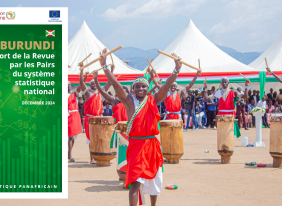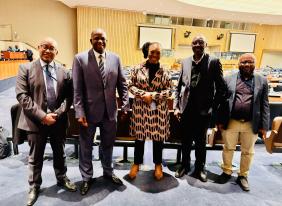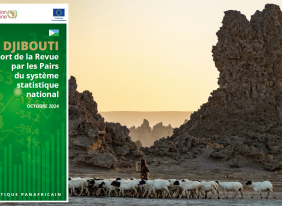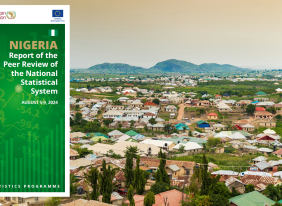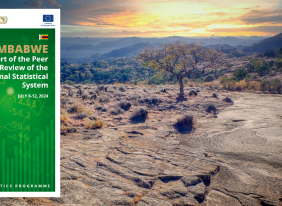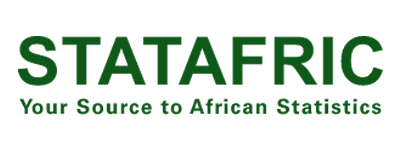The African Statistics Day is celebrated every year on the 18th of November to intensify the development of statistics in Africa. Led by the African Union Institute for Statistics (STATAFRIC), in Tunis, Tunisia, the day will be marked under the 2021 theme- “Modernizing National Statistical Systems to support socio-cultural development in Africa.”
About the African Statistics Day
Over the past decade, the development of statistics has been at the center of the debates of the Assembly of Heads of State and Government of the African Union. Two instruments are central to the development and harmonization of statistics in Africa. These are the African Charter on Statistics (ACS) and the Strategy for the Harmonization of Statistics in Africa (SHaSA). The African Charter on Statistics was adopted in February 2009 in Addis Ababa, Ethiopia, while the first version of SHaSA was adopted in July 2010 in Kampala, Uganda, and the second version of SHaSA was adopted in January 2018 in Addis Ababa, Ethiopia. The African Union Commission has developed several methodological documents for the implementation of the Charter and SHaSA. These methodological documents allow the principles of the charter and the requirements of SHaSA to be integrated into national statistical laws and national strategies for the development of statistics. This state of affairs has enabled the development and harmonization of statistics in Africa.
Several initiatives have accompanied the development of statistics in recent years, which are no less negligible. These are the Committee of Directors General of National Statistical Offices/Institutes (CoDG), the Africa Symposium on Statistical Development (ASSD), the Statistical Commission for Africa (StatCom-Africa) and the Africa Program for Accelerated Improvement of Civil Registration and Vital Statistics (APAI-CRVS). These various initiatives have made it possible to create forums for discussion and exchange on good practices and the challenges of the development and harmonization of statistics in Africa, for better planning, monitoring and evaluation of national, regional, continental and international development.
In order to intensify the development of statistics in Africa, the date of November 18 has been chosen for the celebration of African Statistics Day. Thus, all the main actors of the African statistical system program each year November 18 as the African Statistics Day. During this day, the main actors of the African statistical system discuss the main themes for the development and harmonization of statistics in Africa. It is also an opportunity for the actors of the African statistical system to take a critical look at the thorny problem of the financing of statistics in Africa. Notwithstanding the fact that the Assembly of Heads of State and Government of the African Union has adopted a decision which binds member states of the African Union to allocate at least 0.15% of their national budget for development of Statistics, it is to noted that African states still have a strong and increased dependence on development partners for the financing of national statistical activities.
The 2021 Theme for African Statistics Day
As every year, the African statistical community will again celebrate November 18, 2021, as African Statistics Day. This day will allow actors of the African statistical system to take a very critical look at the development and harmonization of statistics in Africa. This year's theme is “Modernizing National Statistical Systems to support socio-cultural development in Africa”. It is in tandem with the African Union theme of the year 2021 “Arts, Culture and Heritage: Levers for Building the Africa We Want” and calls for strengthening the production of Arts, Culture and Heritage Statistics for Sustainable Development and Building the Africa we Want. The 2021 African Statistics Day theme is intended to raise awareness among decision-makers, technical and financial partners, data producers and users, researchers, and the general public on the importance of data and statistics on cultural and creative economy in the process of building back better and more inclusively, post COVID-19 pandemic.
Global and continental frameworks acknowledge cultural and socioeconomic value of the creative economy.
The importance of Arts, Culture and Heritage and their socioeconomic benefits are reinforced in many National Development Plans as well as in continental and global development frameworks. Along with various instruments on culture adopted on the continent, including the African Union Plan of Action on Cultural and Creative Industries (2005), the Charter for African Cultural Renaissance (2006), and the African Union Model Law on the Protection of Cultural Property and Heritage (2018), Aspiration 5 of the Agenda 2063 – the Africa we Want - focuses on African cultural renaissance and calls for an Africa with a strong cultural identity, common heritage, values and ethics. Promotion of local culture, natural heritage and patrimony, and their linkages with sustainable tourism occupies an important place in the Sustainable Development Goals. Four of the Agenda 2030’s targets referred to culture and tourism, and called to protect, safeguard world’s cultural and natural heritage, and ensure its sustainable management for socioeconomic and cultural benefits.
Globally, the Cultural and Creative Industries (CCIs) play a key role in national economies through their contribution to the Gross Domestic Product (GDP). In addition to the cultural and economic benefits, CCIs show more resilience to external shocks than other industries as evidenced by its steady growth over the past twenty years. Cultural and Creative Industries can also foster inclusive recovery from the COVID-19 pandemic.
Available data has showed that African countries’ total export of Creative Industries has more than doubled between 2004 and 2013, however, Africa's share of the global creative economy remain very low (less than 1%). Today, the cultural and creative industries generate annual revenues of US$2,250 billion and exports of over US$250 billion globally. These sectors provide nearly thirty million jobs worldwide and employ more young people (aged 15−29) than any other sector, representing up to 10% of GDP in some countries (UN, 2021).
Modernizing National Statistical Systems (NSS) is needed to support sociocultural development in Africa.
A recent study by the ECA showed there was poor data availability on the SDG indicators2 related to culture and tourism in African countries. Understanding the challenges and opportunities requires quality data and statistical analysis. In August 2021, the United Nations Educational, Scientific and Cultural Organization (UNESCO) launched the survey of expenditure on cultural and natural heritage (SDG 11.4.1) to collect data for the global monitoring of this indicator. Collecting and analysing CCI data is vital for decision making and policy formulation and should be considered among priorities. In recognition of the importance of CCIs, amidst economic recovery from the COVID-19 pandemic, National Statistical Systems (NSS) on the continent must transform and modernize to be better equipped to provide data and statistics, supporting socio-economic and cultural development in Africa. The impact of COVID-19 pandemic on NSS in Africa has been big and related to financial, operational, and methodological issues among others.
The pandemic has accelerated the quest for transformation and modernization of the NSS. With assistance and support from partners, NSS have developed and used alternative methods for data collection such as telephonic surveys, online, web scrapping and usage of administrative data. However, it is recognized that the process of modernisation needs to continue and be sustained.
The creation of the African group on transformation and modernization of official statistics.
The COVID-19 pandemic has prompted the African community to accelerate and materialize the establishment of the African group on transformation and modernization of official statistics. The statistical community has globally recognized that producers of official statistics need to transform and modernize to adequately respond to all data demands arising from 2030 Agenda, Agenda 2063, regional and National Development Plans as well as other agendas and frameworks. This transformation and modernization cover all areas of official statistics, including the institutional statistical environment, production processes, coordination, and collaboration. The African group on transformation and modernization of official statistics was created by the Statistical Commission for Africa in 2020 to strategically guide and coordinate the work on transformation and modernization of National Statistical Systems in Africa.
The African Union Institute for Statistics (STATAFRIC) which is the African Union's specialized agency for the development and harmonization of statistics on the continent, with its mandate to regularize statistical activity on the continent, will organize a series of events during this day to discuss the challenges of the implementation of the strategy of harmonization of statistics, the financing of statistical activity on the continent and also the use of statistics in planning and monitoring and evaluation in Africa.
Objectives of the African Statistics Day 2021
The objective of the celebration of the African Statistics Day for the year is to exchange views on the theme of the day and also to discuss the implementation of the strategy of harmonization of statistics in Africa. The specific objectives are among others to:
- Discuss the issue of financing statistics in Africa, in particular on the implementation of the decision of the Assembly of Heads of State and Government of the African Union;
- Discuss the importance of statistics during the COVID 19 pandemic, as well as the role that statistics can play in Africa after the COVID 19 crisis;
- Discuss the importance of data and statistics on cultural and creative economy in the process of building back better and more inclusively, post COVID-19 pandemic.;
The launch of the STATAFRIC redesigned and revamped website.
Participation
This event will bring together all Directors General of National Statistics Offices of AU Member States or their representatives, representatives of regional economic communities, civil society, the private sector, other stakeholders and representatives of organizations, partners.
The event will be held in English and French and interpretation into all AU languages will be provided.
Reference and Resource materials
- African Charter on Statistics -
- Strategy for the Harmonization of Statistics in Africa (SHaSA).
- African Trade Statistics 2020 Yearbook.
- 2018 Yearbook on African Trade Statistics.
- 2017 Yearbook on African Trade Statistics.
- Integrating civil registration and vital statistics systems and legal identity management in the digital era
- Taking a holistic approach to legal identity: good practices from integrating civil registration and vital statistics and identity systems around the world
- Civil registration and vital statistics digitalization and innovation: a perspective from Eastern and Southern Africa -
- The civil registration and vital statistics systems improvement framework
